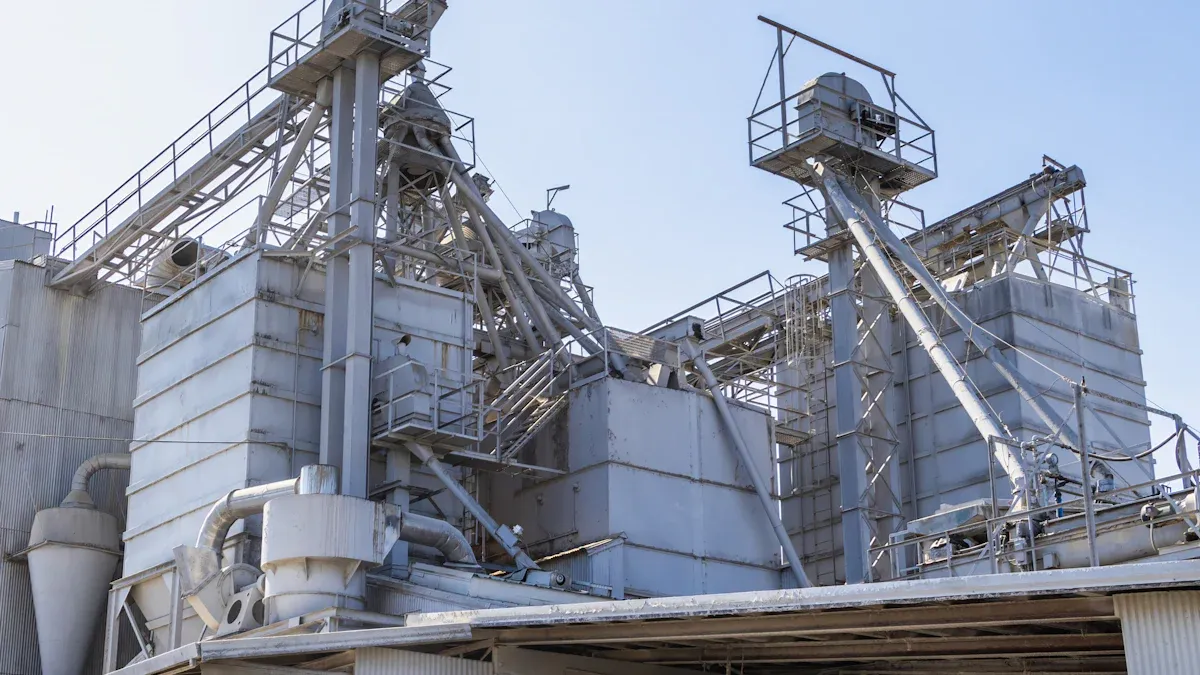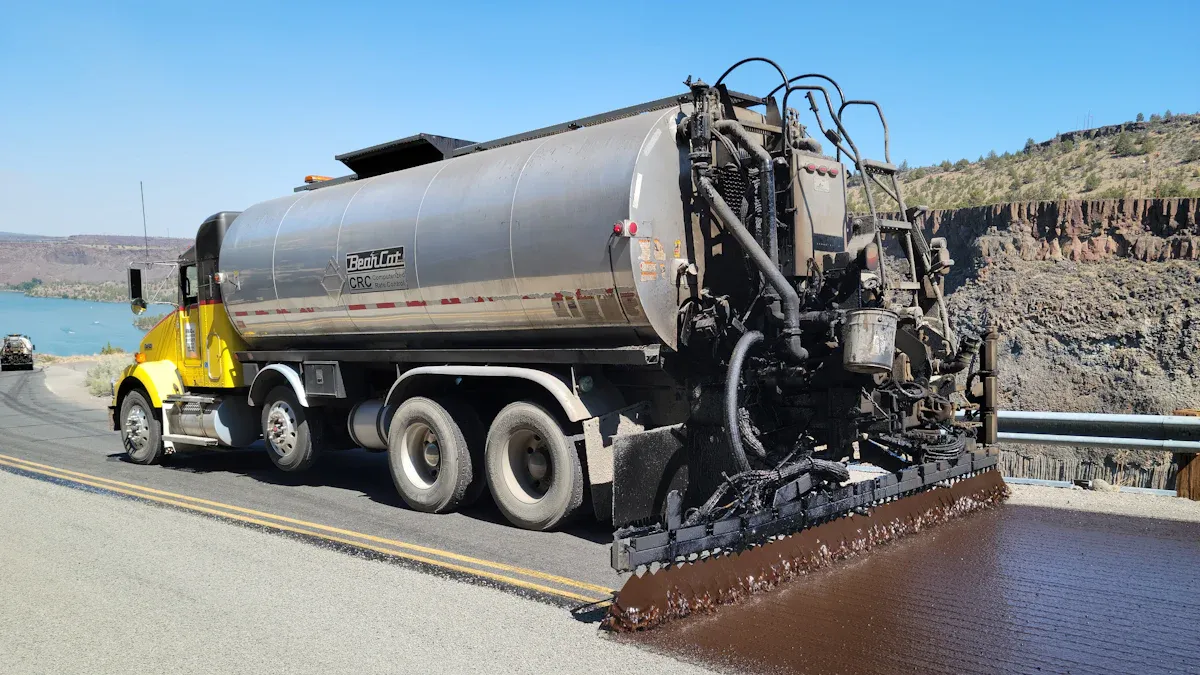
Have you ever wondered what keeps asphalt production running smoothly? Asphalt mixing plant scrapers are the unsung heroes behind the scenes. They ensure materials flow consistently, preventing blockages that could slow down your operations. Modern advancements, like IoT sensors and AI-powered predictive maintenance, make scrapers even more effective. These tools help you avoid unexpected breakdowns and keep your plant running longer. Plus, durable materials like tungsten carbide coatings mean scraper blades stay sharp, so you get high-quality asphalt every time. Without scrapers, you’d face inefficiencies, wasted material, and costly downtime.
Asphalt mixing plant scrapers are vital components of your plant's operation. These tools are designed to handle and manage the flow of materials during the mixing process. Think of them as the hands that keep everything moving smoothly, ensuring that raw materials like aggregates, fillers, and recycled asphalt are evenly distributed. Without scrapers, your plant would struggle to maintain the consistency needed for high-quality asphalt production.
Scrapers are typically made from durable materials like tungsten carbide or hardened steel. This ensures they can withstand the wear and tear of constant use. They’re built to last, but regular maintenance is key to keeping them in top shape. Whether you’re working with a batch or continuous asphalt mixing plant, scrapers play a crucial role in maintaining efficiency and reducing downtime.
Scrapers do more than just move materials—they’re essential for maintaining the quality of your asphalt. Here’s how they contribute to the production process:
Ensuring Material Consistency: Scrapers help mix materials evenly, preventing clumps or uneven distribution. This ensures the final asphalt product meets quality standards.
Reducing Waste: By keeping materials in motion, scrapers minimize waste and prevent material loss during the mixing process.
Improving Efficiency: Scrapers reduce the risk of blockages and downtime, allowing your equipment to operate at peak performance.
Supporting Recycled Asphalt Pavement (RAP): If you’re incorporating RAP into your mix, scrapers ensure it blends seamlessly with other materials.
To keep your scrapers working effectively, you should follow some best practices. Regular inspections, cleaning, and lubrication are essential. Adjusting tension and alignment periodically can also prevent inefficiencies. By taking these steps, you’ll extend the lifespan of your scrapers and keep your asphalt mixing plant running smoothly.

Have you ever dealt with uneven material flow in your asphalt mixing plant? It can be frustrating and time-consuming. Scrapers solve this problem by keeping materials like aggregates, fillers, and recycled asphalt moving smoothly through the equipment. They prevent clumps and blockages, ensuring that everything blends evenly. This consistency is crucial for producing high-quality asphalt that meets industry standards.
Scrapers also help maintain your plant's production capacity. By ensuring materials flow without interruptions, they allow your equipment to operate at its full potential. This means you can produce more asphalt in less time, boosting your overall efficiency. Whether you're working with a batch or continuous mixing plant, scrapers are your best ally for keeping things running smoothly.
Nobody likes wasting materials, especially when it impacts your bottom line. Scrapers minimize waste by ensuring that every bit of material is used efficiently during the mixing process. They keep materials in motion, reducing the chances of spillage or loss. This not only saves you money but also helps you meet sustainability goals by reducing waste.
If you're incorporating recycled asphalt pavement (RAP) into your mix, scrapers play an even more critical role. They ensure that RAP blends seamlessly with other materials, maintaining the quality of your final product. By reducing waste and improving material usage, scrapers help you get the most out of your resources.
Efficiency is the name of the game in asphalt production. Scrapers enhance efficiency by preventing downtime and keeping your equipment running at peak performance. They reduce the risk of blockages, which means fewer interruptions and more consistent production. For asphalt plant operators, this translates to less stress and more time to focus on other aspects of the operation.
To give you an idea of how scrapers improve efficiency, here's a quick look at some metrics recorded by asphalt plant operators:
| Efficiency Metric | Description |
|---|---|
| Collection Efficiency | Affected by venturi design, pressure drop, and particle size. Adjustable throat openings increase efficiency. |
| Pressure Drop Impact | Collection efficiency is directly related to pressure drop. Reducing flow rate decreases efficiency. |
| Water Usage Rate | Efficiency of wet-impingement devices is proportional to water usage and gas velocity. |
| Baghouse Cleaning Cycle | Adjusting cleaning frequency can enhance particulate collection efficiency. |
By integrating scrapers into your asphalt mixing plant, you can optimize these metrics and achieve better results. Scrapers not only improve the performance of your equipment but also make your job as an operator much easier. They’re a small investment with a big impact on your plant's overall efficiency.
Recycling has become a cornerstone of modern asphalt production, and scrapers play a vital role in making it possible. If you're incorporating recycled asphalt pavement (RAP) into your mix, scrapers ensure the process runs smoothly. They help blend RAP with other materials, creating a uniform mixture that meets quality standards. Without scrapers, achieving this level of consistency would be a challenge.
The use of RAP has grown significantly over the years. According to data from the National Asphalt Pavement Association (NAPA), the total tonnage of asphalt mixtures containing RAP increased by 22% between 2009 and 2012, rising from 56 to 68.3 million tons. This growth highlights the industry's shift toward sustainability and high recycling technology. In 2009, 23 states reported producing less than 15% of their asphalt mixtures with RAP. By 2012, that number dropped to just 12 states. This trend shows how essential tools like scrapers are in supporting recycling efforts.
Scrapers also help address one of the biggest challenges with RAP additions: maintaining performance. While higher percentages of RAP can sometimes lead to reduced ride quality or increased distresses, scrapers ensure the materials are evenly distributed. This uniformity minimizes potential issues and helps you produce asphalt that performs well on the road.
High recycling technology has made it easier than ever to incorporate RAP into your production process. Scrapers work seamlessly with these advancements, ensuring that recycled materials integrate smoothly with virgin aggregates and fillers. By using scrapers, you not only improve the efficiency of your plant but also contribute to a more sustainable future. Every ton of RAP you use reduces the need for new raw materials, saving resources and cutting costs.
If you're looking to maximize the benefits of RAP, regular maintenance of your scrapers is key. Clean them frequently, check for wear, and replace parts as needed. A well-maintained scraper ensures your plant operates at peak performance, even when handling high volumes of recycled materials.
Tip: Want to boost your plant's sustainability? Focus on optimizing your scrapers. They’re the unsung heroes of recycling in asphalt production.
By supporting the use of RAP, scrapers help you stay ahead in an industry that values efficiency and environmental responsibility. They make recycling easier, improve material consistency, and ensure your asphalt meets the highest standards.

Scrapers in an asphalt mixing plant work like the hands of a skilled chef, ensuring every ingredient is mixed perfectly. They move materials like aggregates, fillers, and recycled asphalt through the equipment, keeping everything in motion. This prevents clumps and ensures that all components blend evenly. Without scrapers, the mixing process would face interruptions, leading to uneven asphalt quality.
These scrapers are designed to handle tough conditions. Made from durable materials like hardened steel or tungsten carbide, they can withstand the constant wear and tear of moving heavy materials. They’re positioned strategically within the plant to scrape and guide materials along the mixing path. This ensures that no material sticks to the equipment, reducing waste and keeping the process efficient.
The mechanism is simple yet effective. As the mixing drum rotates, the scrapers maintain contact with the drum’s surface. This action prevents materials from sticking and ensures a consistent flow. It’s like having a reliable assistant who never lets anything go to waste.
Scrapers don’t work alone. They’re part of a larger system that keeps your asphalt mixing plant running smoothly. These tools integrate seamlessly with other components, such as the mixing drum, conveyor belts, and feeders. This integration ensures that every part of the plant works together to produce high-quality asphalt.
For example, scrapers work closely with the mixing drum to maintain a consistent blend of materials. They also interact with feeders to ensure that the right amount of material enters the drum. This coordination helps prevent overloading or underfeeding, which could disrupt the mixing process.
Modern asphalt mixing plants often include advanced technologies like sensors and automation. Scrapers play a crucial role in these systems by providing real-time feedback on material flow. This data helps operators monitor the process and make adjustments as needed. By working in harmony with the plant’s equipment, scrapers enhance efficiency and reduce the risk of downtime.
Uniform mixing is the key to producing high-quality asphalt, and scrapers are essential for achieving this. They ensure that all materials are evenly distributed throughout the mixing drum. This prevents issues like clumping or uneven blending, which can affect the final product’s performance.
Imagine baking a cake. If you don’t mix the ingredients properly, you’ll end up with lumps or uneven texture. The same principle applies to asphalt production. Scrapers act like the whisk in your kitchen, ensuring that everything blends smoothly. This results in asphalt that meets industry standards and performs well on the road.
Scrapers also play a vital role when using recycled asphalt pavement (RAP). They help mix RAP with virgin materials, creating a uniform blend that maintains the desired quality. This is especially important as more plants adopt sustainable practices and increase their use of recycled materials.
By ensuring uniform mixing, scrapers contribute to the overall success of your asphalt production. They help you produce a consistent product that meets your customers’ expectations and stands up to the demands of modern infrastructure.
Scrapers are tough, but they’re not invincible. Over time, they face wear and tear from constant use. You might notice reduced efficiency or uneven material flow. These issues often stem from buildup on the scraper blades or misalignment within the equipment. If left unchecked, they can lead to costly downtime and lower production quality.
Another common challenge is dealing with emergency situations like sudden equipment failures. For example, a scraper blade might break or jam, disrupting safe operation. These emergencies not only slow down production but also pose safety risks to operators. Regular inspections can help you catch problems early and avoid unexpected breakdowns.
Environmental factors also play a role. Exposure to extreme temperatures or moisture can weaken scraper materials. Protecting your equipment from the elements is crucial for maintaining safety production standards and extending its lifespan.
Preventative maintenance is your best defense against scraper issues. Start by inspecting your equipment regularly. Look for signs of wear, buildup, or misalignment. Cleaning the scraper blades frequently helps prevent asphalt residue from hardening and affecting performance.
Lubrication is another key step. It keeps the moving parts of your equipment running smoothly and reduces friction. Make sure to use high-quality lubricants designed for asphalt mixing plants. Also, check the tension and alignment of the scrapers. Adjusting these settings can prevent uneven wear and ensure safe operation.
Don’t forget to address spills and leaks immediately. These can lead to buildup on the scrapers and other parts of your equipment. A quick cleanup keeps everything running efficiently and minimizes the risk of emergency repairs.
Want to keep your scrapers in top shape? Follow these practical tips:
Remove excess asphalt immediately after each use.
Use a high-quality asphalt release agent to prevent buildup.
Power wash the equipment properly to clean hard-to-reach areas.
Address spills and leaks as soon as they occur.
Frequently inspect and clean the auger and screed for optimal performance.
Apply an asphalt solvent to tackle tough residue.
Clean the undercarriage and conveyor belts regularly.
Check and clean filters and cooling systems to avoid overheating.
Protect your equipment from extreme weather conditions.
Stick to a scheduled maintenance plan to catch issues early.
By following these steps, you’ll not only extend the lifespan of your scrapers but also improve the overall efficiency of your asphalt production. A little care goes a long way in keeping your equipment running smoothly and safely.
Tip: Always prioritize safety when performing maintenance. Wear protective gear and follow your plant’s safety guidelines to avoid accidents.
Asphalt mixing plant scrapers are the backbone of efficient asphalt production. They keep materials flowing smoothly, ensuring consistent quality and reducing waste. By maintaining your scrapers properly, you can extend their lifespan and improve your plant's performance. Regular inspections and cleaning go a long way in avoiding downtime and keeping operations safe. When you understand their role, you’ll see how these tools make your job easier and your asphalt better. So, take care of your scrapers—they’re essential for success.
Scrapers keep materials moving smoothly through the equipment. They prevent clumps and ensure even mixing, which helps produce high-quality asphalt. Without them, your plant would face inefficiencies and material inconsistencies.
Inspect and clean scrapers weekly. Remove buildup, check alignment, and lubricate moving parts. Regular maintenance keeps your equipment running efficiently and extends scraper lifespan.
Yes, scrapers are designed to blend RAP with other materials. They ensure a uniform mix, helping you produce asphalt that meets quality standards while supporting sustainability efforts.
Scrapers are typically made from hardened steel or tungsten carbide. These materials resist wear and tear, making them durable enough for heavy-duty use in asphalt mixing plants.
Scrapers prevent blockages and keep materials flowing consistently. This reduces downtime and allows your plant to operate at peak performance, saving you time and money.